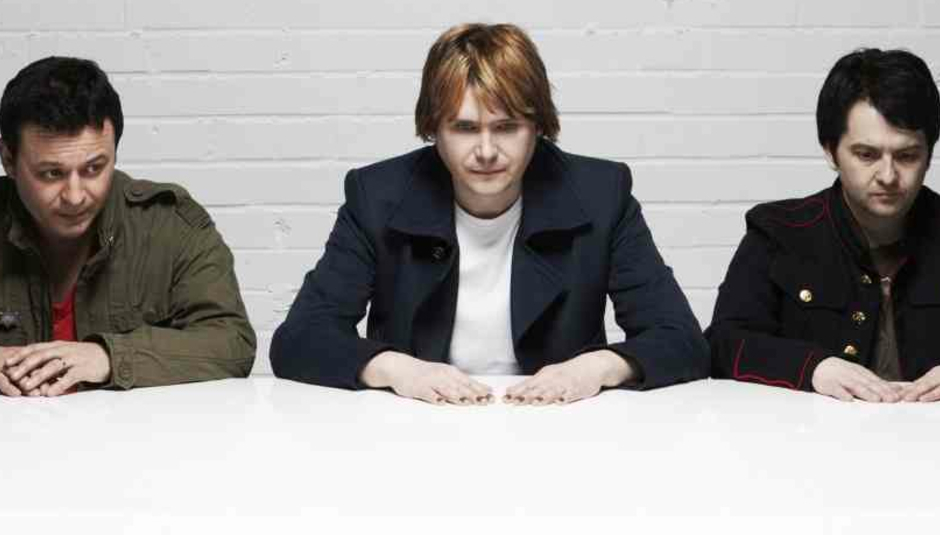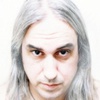When setting up our recent Artist 'n' Artist feature for Catherine A.D. with Tori Amos, we knew it was a longshot so we gunned for a few other people on her hitlist at the same time. And lo! Lady Luck shot two lightning bolts and both the Manics and Tori Amos confirmed the interviews.
So, without further ado, we hand you back over to the DiS-tipped Catherine A.D. and the first of a three part epic interview backstage at The Roundhouse in Camden with Manic Street Preachers' Nicky Wire.
PART ONE: Nicky Wire on Journal for Plague Lovers
CAD: So, I was looking at the credits on the new album, and you credited Richey as “Richard James Edwards”. I wondered whether that was a conscious decision to credit the person, rather than the myth?
NW: I think so… I think the whole process has been about that - trying to place him as a writer… and as a kind of “critic” of culture, and a disseminator of the truth, so yeah. It’s not kinda rock and roll mythology...
CAD: So, getting away from this ridiculous rock’n’roll myth…
NW: Yeah… but I mean, it’s not ridiculous, because I grew up falling for rock’n’roll myths. You know, when I was 16 I loved all that stuff, so I can understand why people are attracted to it. But there are many memories that go before that... and way beyond that, just of him as a person… making music… going to Swansea University… it doesn’t get any more normal than that.
CAD: No, people forget about that side of things don’t they… ? Thinking about 'normality' then, the first line on the record is “the more I see / the less I scream” – did you find yourselves becoming inoculated to the subject matter as you went through the process of turning the lyrics into songs?
NW: We did… we treated it very academically. There was a sense of distance...
CAD: I imagine you have to do that as a survival mechanism almost?
NW: Yeah, I think, you know even with The Holy Bible there was a sense of that. I remember saying at the time – the worst thing I could ever do would be to try and copy Richey because I can’t go to the places he goes, it’s not my mental state. I don’t feel like that that – it would have been such fakery to pretend I did. So, we did treat these lyrics with as much respect, and academic discipline as we could. I think when we finished the record and sat back, there was a far bit of emotional baggage...
CAD: And were you worried at all about how the hardcore [fans] would react?
NW: [Laughs] I’m always fucking worried about that! That depends on what clothes I’m wearing or what pair of trainers… let alone doing Richey’s album! Like I said in other interviews, it did come from James, this album. I know he’s looked at the lyrics over the last few years - I know he’s dipped in, and he finally came to the point where he really wanted to [use them], and he felt it was the right thing to do. It was a relief. That sounds weird. But the fact that James said it and that he was going to compose so much of the music, that reinforced that it was the right thing to do.
CAD: Does it frustrate you at all that so much attention has been focused on the lyrics, when it’s also such fantastic album, musically speaking?
NW: No, it doesn’t really. With The Holy Bible, maybe, there might have been a bit of that because it was a different beast back then, but we did this album in mind to try and place him up there with the greats, for his lyrics. The music would always just come afterwards. I do think musically it’s great, but I’m just really happy that… what’s that website, Metacritic? Which collates everything? I think the rating we got on there was 83%, which means “Universally Adored”
CAD: Do you pay attention to all of that then…?!
NW: To critics, yes. I read every fucking tawdry good/bad thing…
CAD: When you wrote the album, did you write very much in mind knowing that you were going to be recording with Steve Albini? It seems to me maybe you were placing these restrictions on yourselves as some kind of an artistic strategy?
NW: Yeah. And it did feel like that. That there had to be certain parameters that were inbuilt. I think I pushed the idea of making The Holy Bible: part two, too much at the start… that was me having to have symmetry. Those parameters, those disciplines… similar to the Holy Bible. We were going to do it ourselves, in Cardiff, in a shitty studio, and I was going to be something of a bystander lyrically cos Richey’s writing is... was... so amazing back then. It felt like we were almost being a backing band at times… which was actually really nice. Somehow felt less pressure than having to write a massive hit record.
CAD: That’s also something writers do sometimes… they go to restricted forms, writing sestinas, or using some kind of poetic form where you have strict parameters, and you’re pushed somewhere by these restrictions.
NW: Yeah. It’s exciting and bizarrely [it] makes it easier. That classic thing of giving yourself too many options, you just become confused. I mean, you’ve only got to look at our back catalogue… to see that sometimes that’s what happens! [laughs]. I think Richey’s lyrics undoubtedly pushed us to places that mine can’t. If you look at them, they’re jagged… they’re staccato… they are… people say it’s poetry, but I see it as analysis, as "analytical news" almost.
CAD: Well, when I looked at the notebooks… they’re very much placed as lyrics – there’s a bridge, there’s a chorus. It’s not like he’s trying to write a sonnet!
NW: Yeah. Some of the fans think that the fact that we edited a little bit… is a heinous crime. But some of it like ‘Jackie Collins...’ was written like that; ‘Virginia State...’ is pretty much verbatim – he did write them as lyrics. Whenever we wrote, we always edited each other - I’d edit his; he edited mine. James would edit both of ours.
CAD: So it’s just people picking up on a process that's always been part of the way you work?
NW: That’s totally true. That’s why we didn’t feel there was anything odd about it, or wrong because it’s always been.... I mean, even with ‘Design for Life’, in my case, it’s two pages long… and James cut it down to about fucking eight lines… Y’know I’m not complaining!
CAD: You talked about how you started thinking about [the new record] as The Holy Bible: part two, but in the end it seems there is much more of a softness … there’s much more resignation to the record. Was that part of a concerted effort to be less angular or do you think it’s a product of you having written these much more “pop” records in the interim? – I mean "pop" in a good way!
NW: Yeah, I know what you mean – but it was all down to James being fiercely, er... I think we started off like with maybe 'All Is Vanity' which I think could maybe fit on The Holy Bible and then a couple of others and I think James just said to me, "Look, I know what you mean about The Holy Bible, but we’ve got to let the lyrics guide us." So, whatever song came up… I mean obviously I wrote the music to ‘William’s Last Words’, which is – it’s fey, and indie… [laughs]
CAD: But it’s a really majestic song though – you wouldn’t call it depressing - it’s got an uplifting, bittersweet feel, a sepia colour to it.
NW: Bittersweet is a good word. There’s a sense of calm and serenity. The Holy Bible is all about disgust and hatred but these lyrics… although they have bleak conclusions. I’m not pretending everything is wonderful - but there is a calmness to them. It feels like Richey’s been through this cataclysmic process, of dissecting everything, and the conclusions he’s come up with, although bleak, they do seem rational.
CAD: In that sense, does it piss you off that you’re presented as this unrelentingly miserable band when you’ve got so much humour here? 'Me and Stephen Hawking' and ‘Jackie Collins Existential Question Time’ both made me laugh! You seem to have this really wry sense of humour as a band that often gets overlooked.
NW: I think Manics fans have always got that. Someone said this record was like porn for Manics fans – you’ve got Jackie Collins, Stephen Hawking… it did have that sense of ridiculousness that we’ve always had, and some people, like you said… we’ve always been categorized as po-faced. It’s kind of idiocy, really. The clothes we’ve worn and the stupidity of the things we’ve said. Jon Savage [England’s Dreaming author] used to call The Sex Pistols "the fabulous disaster", and we always really liked that idea… the sense of disaster. A slight insanity to the process.
CAD: And how did the reaction to the Jenny Saville cover affect you? [see YouTube below] Did that frustrate you in terms of the misreading of the image or do you still enjoy the capacity to shock ?
NW: I was just amazed that it did shock people… I was truly stunned. When I first brought the picture in to the band, they agreed it was perfect. It’s innocent, it’s androgynous, those beautiful eyes, blah-de-blah. It was a beautiful image. Then we showed it to someone, and they said, “Doesn’t it look like a child who’s been beaten up?”
Jenny [Saville] came to the gig last night, and I was talking to her in this very spot for a couple of hours. I was just really relieved that she just thought it was great. She didn’t think we tried to use it as publicity. She gave us the painting for free... When people ask us, “what do you think Richey would have thought of the album?” and you just can’t tell really but the one thing we know for certain is he would have loved the cover! If nothing else [laughs].
---
Read Part Two of the interview with Nicky Wire here. The concluding an be found here.
Journal for Plague Lovers is out now. The Journal for Plague Lovers remix EP is released today featuring reinterpretations by The Horrors, Adem, Errors, British Sea Power and Andrew Weatherall.
Catherine A.D. is currently working on her debut album and plays Latitude on Nick Cave Day (Sunday).






















